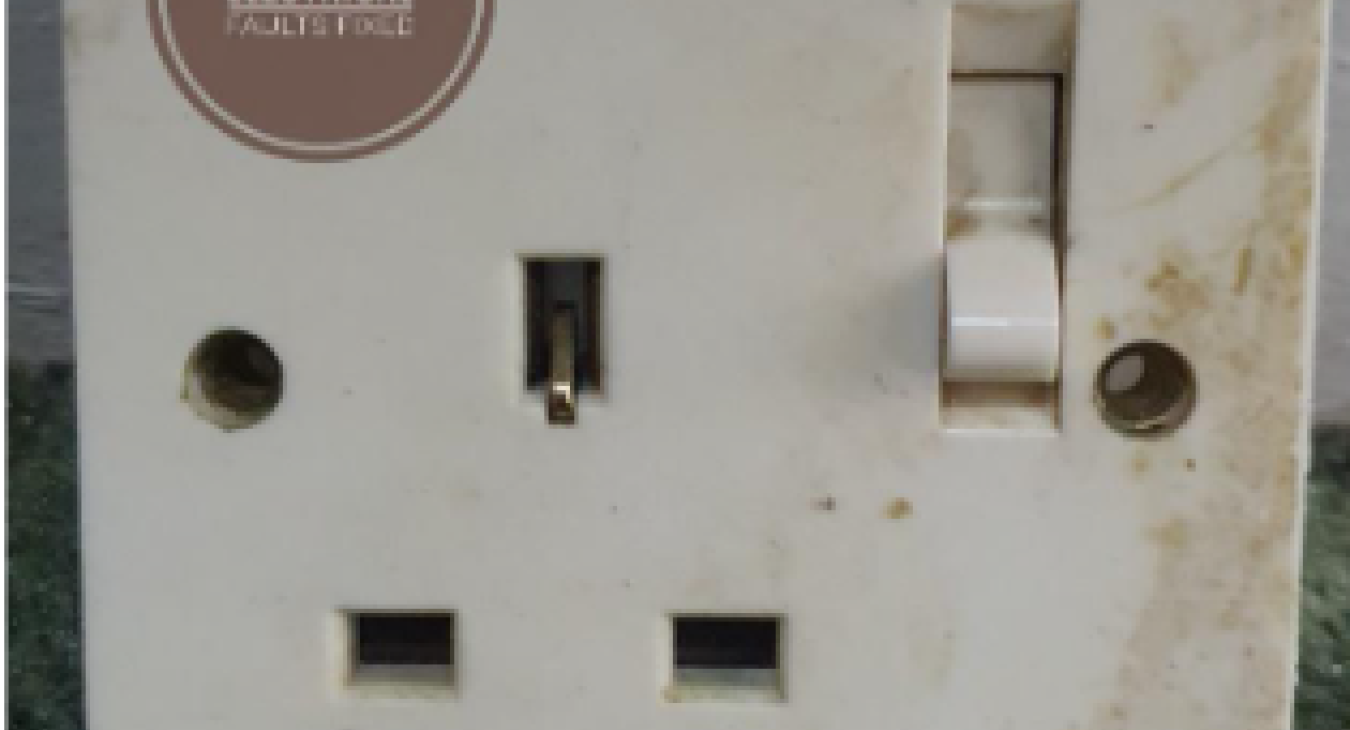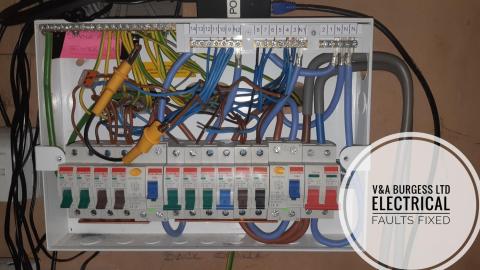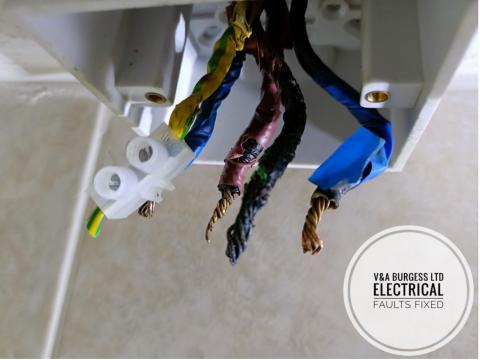
Table of Contents
- The lifespan of plug socket outlets: When to replace?
- Signs of Wear and Tear or Scorching
- No power to the socket
- Electrical Safety Concerns
- Plugs don’t fit in the socket easily
- Modern Demands on Electrical Outlets
- Sparking and Crackling, Pops and Bangs
- Plug Sockets are Hot
- Burning Smells
- Plugs Fall out of Your Sockets
- Fuses Keep Blowing
- Power to appliances cuts out intermittently
- DIY or Call the Professionals?
- Common Questions
1) The lifespan of plug socket outlets: When to replace?
All electrical sockets, switches and wiring have a finite lifespan that, if exceeded, is likely to lead to electrical problems and issues. Generally speaking, if your plug sockets are over 15 years old then you may want to consider replacing them but if they are over 25 years old then it is likely they have served their useful life and should be replaced before issues occur.
As electrical outlets age, internal components suffer wear, corrosion and develop high internal resistances to electrical current flow. Despite any outward appearances of the plug socket itself, the internals and connections at the rear may be loose, worn out and require replacement.
British General, a plug socket and electrical accessories manufacturer, offer a 25 Year Warranty on their products so they have real confidence in the quality of their equipment!!
Back to top2) Signs of Wear and Tear or Scorching
Should your plug sockets be showing signs of abrasion, cracking, chips, or other mechanical damage then it is best to have them replaced. If there are scorch marks anywhere on the socket or around the holes where plug pins are inserted then this is a BAD sign.
It does not matter where the damage occurs on a plug socket, the moment it becomes damaged it deviates from the manufacturers intended design in its safety and operation and should be replaced. Broken, burnt or damaged plug sockets are not intended to carry on offering safe service to the electrical installation and should be seen as an immediate danger.
Back to top3) No power to the socket
This may seem like an obvious point here but if there is no power to the plug socket then it may be that the plug socket has failed. Check the other plug sockets in the room and see if they are working. IF none are working then go and check the electrical panel / consumer unit / fuse box and see if any of the switches has tripped or fuses have blown.
If just one plug socket is not working then the problem is localised to that and it needs to be checked. The cause could be several things including: Burnt wires, Damaged Cabling, Failed Socket, Loose Connections inside or at the terminals on the rear of the socket.
Back to top4) Electrical Safety Concerns
If you have electrical safety concerns over your plug sockets then it may be time to have them replaced. Many electricians are happy to offer free advice and this is often done over video chat or by sending photographs of the issues on messenger apps.
Explain your concerns to your electrician and ask their advice, it may be that some investigation or fault finding needs to be carried out in order to establish the cause of any issues that you are experiencing. Fault finding is not a free service as it involves a site visit, test equipment, specialised tools, and knowledge but it will get to the bottom of most issues quickly and enable you to obtain peace of mind.
Once the issues have been discovered your electrician will be able to quote for repairs or on some occasions, fix there and then for no extra cost. 😊
If you are concerned that several socket outlets have failed then it is likely that all socket outlets should be replaced.
Back to top5) Plugs don’t fit in the socket easily
When a plug does not fit into a socket easily it is a sign that there is likely an issue with the shuttering mechanism inside the plug socket or there are other components that have shifted inside. This can make it difficult to insert a plug safely without great force.
Excessive wear and tear can be a cause of this situation. Where poor quality or cheaper plug sockets have been installed in an electrical installation, they are likely to fail sooner and cause issues more quickly than better quality electrical accessories.
6) Modern Demands on Electrical Outlets
The electrical installations in our homes are subject to much greater use than in decades gone by and as such, the electrical demands placed upon the electrical outlets, switches, electrical panels, and other equipment are far greater.
When electrical plug socket outlets are overloaded with too many plug-in appliances, they can wear out more quickly and fail sooner. The most common issue that we see as an Emergency Electrician in Warrington is that high-powered Kitchen Appliances are plugged in to the same socket outlet. This can be a washing machine and tumble dryer into the same socket which then overloads it or several appliances used together in an extension lead causing overheating.
Most electrical outlets are only rated to 13 amps meaning that high powered appliances cannot be used in the same double socket outlet at the same time. There is a handy calculator to establish what appliances are likely to overload and extension lead AND the same would apply to a double socket outlet. It’s just here.
Back to top7) Sparking and Crackling, Pops and Bangs
If you find that your electrical plug socket outlets are creating strange noises like snap, crackle, or BANG then it is likely to be a serious issue and one that should not be left without investigation. Simply “not using that socket” is NOT ENOUGH! There is danger and it should be investigated by a professional immediately.
Popping and banging noises from electrical sockets are an indication that there is possible shorting out occurring which is creating miniature explosions as enormous fault currents develop between conductors.
During normal operation, plug sockets may become warm which is normal especially when there is a high demand for electrical current. Such high demands are common when using electrical heating equipment, cooking equipment or anything that contains a heating element such as hairdryers, curling irons, stoves, and kettles for example.
The plug socket should never become hot to the touch! If the socket goes beyond warm to hot then there are electrical problems that need to be addressed immediately. Such electrical problems could be the socket failing, internal high resistances, loose connections on the wiring and other issues.
Back to top9) Burning Smells
If you discover a burning smell coming from your plug sockets then this is a sure sign that there are problems. One of the indicators for WHEN TO REPLACE PLUG SOCKETS is the smell of burning occurring. The front of the plug socket could look normal like the one below but that doesn’t mean that there are not issues.
It can take a while for sockets to go bad enough to burn and when the smell is able to be detected it is usually a sign that things are already very serious. Burning normally occurs at the rear of the plug sockets and for the smell to have reached somebodies nose in the room means that the socket and wiring is likely to be very severely damaged or completely destroyed!
For more on burnt plug sockets have a look at this article.
Back to top10) Plugs Fall out of Your Sockets
A plug socket should hold the pins of a plug securely. In order to insert a plug in a socket, a reasonable level of effort must be needed such that one is confident that the socket will hold the plug once the pushing force is withdrawn.
If the plug feels loose going into the socket and the plug falls out then the socket outlet may well be finished. Try a different plug in the socket and see if all plugs have the same issues thereby eliminating the plug as an issue and highlighting that the electrical socket needs replacing.
Fuses in appliance plug tops need to overheat before they blow. It is a fact of the way they work. This can be instantaneous when a very large fault current occurs or much slower when there is an overload with too much electrical current passing through the fuse gradually.
If a plug top is getting very hot then it is possibly because the fuse itself is continually getting hot but not hot enough to blow. This could be as a result of overloading but it could ALSO be as a result of loose connections on the plug pins contacting with the internal connections of the plug socket.
When loose connections occur in this manner, they create a high resistance to electrical current flow. The electrical current still manages to flow but a great deal of heat is generated in the process. This heat can pass down the plug top pins to the fuse and blow it. 😊
If you have fuses blowing regularly then consider changing the plug socket / sockets that appear to be causing the issue.
Back to top12) Power to appliances cuts out intermittently
If the power to appliances cuts out intermittently then this means that the appliance is not receiving the electricity supply that it requires at the level it requires in order to operate correctly.
This could be down to failing plug sockets. As mentioned above, high resistances caused by loose connections, dirt and debris build-up, poor wiring or aging plug sockets can all cause this intermittent power loss problem to the appliances.
This matter also should be investigated and is a sign that plug sockets may need replacing.
Back to top13) DIY or Call the Professionals?
For this type of job, Always the professionals. Many electrical jobs absolutely MUST be carried out by a professional as the average DIY enthusiast simply does not have the knowledge of the wiring regulations, safety measures, electrical test procedures, tools, or specialised test equipment in order to be able to carry out the installation safely and in accordance with the legislation.
Back to top14) Common Questions
14.1) Do plug sockets wear out and how long do plug sockets last?
Plug sockets will eventually wear out due to their internal moving parts becoming worn, their switches becoming stuck or their terminals working loose at the rear of the plug socket. The life span of the plug socket greatly depends upon its use once installed and any maintenance that may have been carried out.
Plug sockets that are installed in a busy domestic kitchen are likely to fail far sooner than those installed in the small bedroom which may not be in regular use.
14.2) What can cause a burnt socket?
There are a number of causes of a burnt plug socket, in fact, there is a whole article written about it here:
https://www.electricalfaultsfixed.co.uk/blog/burnt-plug-socket
14.3) Can you replace your own plug sockets?
Yes and no, but it is not quite as easy as you may think.
Whilst some people think “it is just three wires”, there is a lot more to consider when replacing plug sockets than this. First of all, the continuity of the ring final circuit must be checked if the plug sockets that are being replaced are part of a ring final circuit. If the circuit is not a ring final circuit, then it is still a good idea to check the R1+R2 reading prior to carrying out works to ensure that the circuit complies and there are no loose connections.
Once the swap has been carried out and the work completed in accordance with BS7671, the need to re-test the work appears. A suitable and compliant Zs reading should be obtained from the newly replaced socket to ensure that circuit disconnection times will be met.
This additional ‘unknown’ work which is never mentioned regarding DIY, is generally only able to be completed by electricians with the correct test equipment and specialist knowledge to carry it out safely. Without testing, there is NO WAY to ascertain if the circuit or replacement sockets are actually safe. There is no way to comply with the wiring regulations without testing and should anything go wrong and someone become injured or damage occur to property there may be some difficult questions asked of the DIY installer. ☹
14.4) Should plugs be removed from sockets?
Wherever possible and practicable, it is sensible to remove plugs from sockets. There are certain items of equipment that cannot be removed such as fridges and freezers and, in these cases, its ok to leave the devices plugged in.
Appliances and equipment that isn’t in use should be removed from the plug socket outlets to prevent any possible faulty equipment from causing a fire, to prevent any damage to the equipment from supply surges and to ensure that electrical and fire safety are prioritised in the home at all times.
14.5) Can you replace a sealed plug with a normal plug?
YES, you can. The moulded plug should be removed and the pins broken such that the plug can never be accidentally inserted into a socket by anybody. The new plug should be carefully wired on and the correct fuse selected.
There is some information on our site regarding replacing a plug top.
If you have any further questions about replacing the plug sockets at your Warrington home, contact us here at Electrical Faults Fixed.











